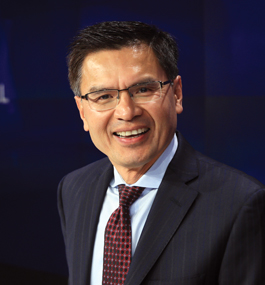A Fearless Dive into COVID-19 Drug Research

Vu Truong ’86, P’20
The fall of Saigon, on April 30, 1975, was an early lesson in grit for Vu Truong ’86, P’20. “It was a harrowing experience for a 10-year-old kid,” he says. “There was bombing everywhere.”
To escape the destruction, Truong’s father piled his nine kids (Truong’s mother had died two years earlier) into a small Toyota Corolla station wagon and drove to the nearest port. The family found a boat they could board, and, after a few days at sea, they were picked up by a U.S. Navy ship.
In Vietnam, Truong’s father had been a wealthy industrialist who owned factories, mills and banks. In Pittsburgh, where the family settled, he was a janitor. Despite the family’s hardships, Truong doesn’t remember feeling hopeless. Instead, “our situation conditioned us to work hard and not take anything for granted,” he says.
Today, Truong is hard at work as the CEO and chief scientific officer of Aridis Pharmaceuticals, a clinical-stage San Jose, California-based company that develops biopharmaceutical therapies for infectious diseases. In an interview conducted this summer, Truong said the company was well-positioned to develop both a COVID-19 treatment and a delivery system.
Antibodies, or proteins made by the immune system to fight infections, are expected to be an important treatment option for COVID-19, even if a vaccine becomes available. “Vaccines are not 100% effective, and there is always a segment of the population that will not get vaccinated, regardless of efficacy,” Truong explains. “We have a technology platform that allows us to, essentially, scan the immune system, particularly the cells that make antibodies, and figure out which cells are making the antibodies that are most neutralizing to the pathogen.”
Aridis is looking at blood samples from COVID-19 survivors to discover which cells produce the highly neutralizing antibodies. “We’re making great progress in identifying the candidates,” says Truong.
The company is also attempting to figure out how to deliver a COVID-19 drug or vaccine around the world. Because key conditions, such as average temperatures, will vary widely, global delivery is going to prove “a major challenge,” Truong says.
Truong has always liked solving scientific problems. He won first prize in the Massachusetts State Science Fair during high school (after his family had moved from Pittsburgh to Boston’s Allston neighborhood). One of his older brothers attended Brandeis, so Truong knew the university was strong in biochemistry, which he wanted to study. Although he was accepted at several Ivy League schools, he chose to enter Brandeis, which offered him the Dr. Martin Luther King Jr. Fellowship, a scholarship based on performance, leadership, community involvement and financial need.
After graduation, Truong stayed at Brandeis to work in the lab of biochemistry professor John Lowenstein, then entered a PhD program in biochemistry at Johns Hopkins.
“I always think back to Brandeis,” says Truong, whose older daughter and nephew also attended the university. “Learning from truly world-class scientists who were doing fundamental research. Learning critical thinking. Learning how to read a scientific paper. Brandeis gave me a foundation that has helped me dive into the depths of science.”
The resilience he began building early in his life is helping him take on the biggest health crisis of our time, including facing the reality that his company’s COVID-19 solutions may not succeed commercially.
“We are dealing with a business proposition that is daunting, because you’re competing with so many other companies,” Truong says. “When we decide whether to pursue a new line, we ask ourselves what advantages we have — do we have something that could potentially be differentiated and be better than what everyone else produces? We’ve done that analysis, and we decided yes, we think we have substantial value to offer.”
— Abigail Klingbeil
